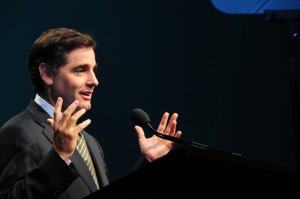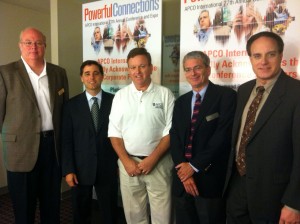FCC Chair Outlines Steps to Accelerate Adoption of NG9-1-1

FCC Chair Julius Genachowski addressed attendees of the APCO International Conference & Expo in Philadelphia on Wednesday, Aug. 10.
The plan for a nationwide broadband network for public safety, NG9-1-1 and funding issues were at the top of the priorities addressed by FCC Chairman Julius Genachowski during the closing SuperSession at the 77th Annual APCO Conference & Expo. He spoke to a packed ballroom in Philadelphia.
A former EMT and CPR instructor, Genachowski understands the unique demands of emergency response and the necessity of reliable communications. In his remarks, he talked about the new technologies that are transforming communications — texting, photos and video — commenting on the fact that in 2005 only 18% of cell phones had cameras and that today nearly 100% do. “We’re on the other side of the tipping point,” he said.
To make the statistics real, Genachowski related a story about his mother: “Nobody would describe my wonderful mother as a techie,” he said. “She wasn’t even online a couple of years ago. But today’s she’s searching, e-mailing and zapping pictures to her grandchildren. This summer, she learned to text.”
He decried the fact that “only one month away from the 10th anniversary of 9/11, our first responders still don’t have an interoperable mobile broadband network for public safety. Our 9-1-1 call centers still can’t handle texts or pictures or video being sent by the phones that everyone has.”
Genachowski outlined programs already in place and steps that he believes the country needs to take to harness the power of this technology.
He recalled the launch of a mobile emergency alert service called PLAN, the Personal Localized Alerting Network, in New York a few months ago. He also mentioned the framework established for a nationwide interoperable public safety broadband network, including adopting LTE as the standard air interface for such a network and the establishment of the Emergency Response Interoperability Center and the Public Safety Advisory Committee to hasten its deployment.
The FCC has already granted 22 waivers for jurisdictions to begin building out the public safety broadband network. “Unfortunately,” said Genachowski, “I can’t give you the news we all want to hear: that Congress has funded a nationwide, interoperable broadband network for public safety. As we said in the FCC’s National Broadband Plan more than a year ago, the network won’t get built if Congress doesn’t fund it.”
Genachowski’s comments to the APCO audience reinforced statements he made at the White House on June 16. At that time he said, “I applaud the Senate Commerce Committee for its strong bipartisan action [in support of S. 911 on June 8] to move forward with a public safety mobile broadband network and with incentive auctions to free up new spectrum for commercial use and to raise significant amounts of money.”
The mechanism to fund the network does exist — and without adding to the deficit. In his remarks to APCO, Genachowski said the plan involves voluntary incentive auctions that would “generate $25 billion in revenue, according to the Congressional Budget Office, more than enough to cover the costs of a national public safety network.”
“I’m deeply concerned that legislation hasn’t yet been adopted,” he said. “Every day of delay risks compromising the vital goal of interoperability, the core of the 9/11 Commission’s recommendation. I’m deeply concerned that 9/11 of this year will come and go, and we’ll still be waiting. I’m renewing my pledge to work hard with you on this. There’s no greater priority than moving forward on a smart spectrum plan to save lives and create jobs.”
“NG9-1-1 will run on the broadband network of the 21st Century,” said Genachowski, discussing benefits of the technology for both citizens and first responders. He stressed the need to develop location accuracy mechanisms for NG9-1-1, to complete and implement the technical standards that will define the architecture, to build a governance framework for NG9-1-1 and to establish funding mechanisms for NG9-1-1, stating, “We need to make sure the 9-1-1 fees the states collect are not being diverted elsewhere.”
Genachowski also said the FCC plans to consider a Notice of Proposed Rulemaking in September that will accelerate NG9-1-1 adoption.
“Working together,” he said, “we will get this right.”

Members of the APCO International Executive Committee of the Board of Directors and staff greeted Julius Genachowski upon the conclusion of his remarks at the conference. From left: Terry Hall, Genachowski, Bill Carrow, Robert Gurss and Mark Cannon. Not pictured: Gregg Riddle, who remained on the dais.
Following Genachowski’s remarks, APCO President Gregg Riddle said, “On behalf of APCO International, I thank Chairman Genachowski and his dedicated staff for their ongoing cooperation and commitment to continue to work extensively with our membership and its leaders on a wide diversity of issues impacting public safety and its communications.”


